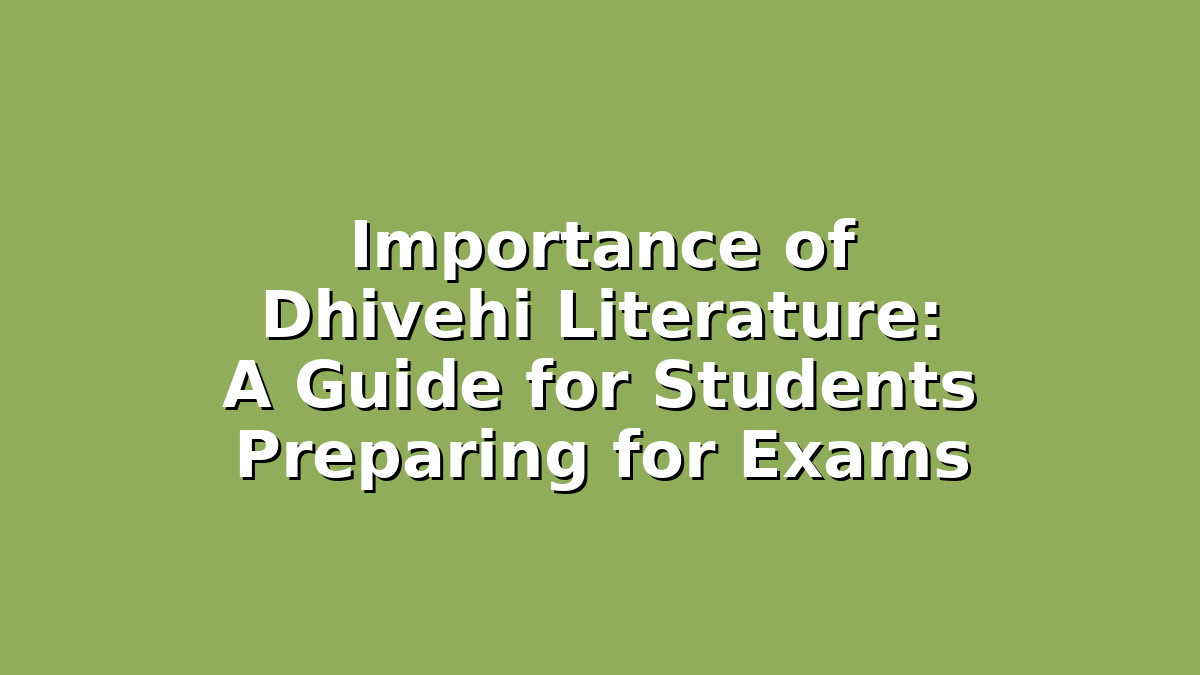As students preparing for exams, it is essential to recognize the value of every subject you study, especially those that connect you to your culture and history. Dhivehi literature, the body of literary works composed in the Dhivehi language of the Maldives, is not only a rich source of cultural heritage but also a crucial component of your academic growth. Understanding the importance of Dhivehi literature can enhance your appreciation of your language, improve your exam performance, and deepen your connection to Maldivian identity.
In this article, we will explore the significance of Dhivehi literature and provide practical study tips to help you excel in this subject. Whether you are preparing for language exams, national assessments, or simply aiming to improve your study habits, this guide will support you in making the most out of your learning experience.
1. Understanding the Cultural and Historical Significance of Dhivehi Literature
Dhivehi literature is more than just stories and poems; it is a mirror reflecting the Maldivian way of life, values, and history. From ancient folk tales to modern poetry, the works written in Dhivehi encapsulate the Maldives’ cultural identity and social evolution.
Why This Matters for Students:
– Develop Cultural Awareness: Studying Dhivehi literature enables you to learn about your ancestors’ experiences, traditions, and beliefs. This cultural knowledge enriches your worldview and fosters pride in your heritage.
– Contextual Understanding: Many exam questions require you to analyze texts within their historical and cultural contexts. Knowing the background of literary works will help you interpret themes, characters, and messages more effectively.
– Enhanced Critical Thinking: Literature encourages you to think critically about societal issues and human nature. Engaging deeply with Dhivehi texts can sharpen your analytical skills, which are valuable across all subjects.
Study Tip: Create a timeline of important Maldivian historical events and literary movements. Linking the literature you read to specific time periods will help you remember key contexts and answer exam questions with confidence.
2. Improving Language Skills Through Dhivehi Literature
One of the primary benefits of studying Dhivehi literature is that it strengthens your language skills, including vocabulary, grammar, and expression.
Why This Matters for Students:
– Vocabulary Expansion: Reading a variety of literary genres exposes you to new words and phrases that are often used in official exams or writing assignments. This expanded vocabulary will improve both your comprehension and your ability to express ideas clearly.
– Grammar and Syntax Mastery: Literature provides examples of correct grammar and sentence structure in natural use. By studying these texts, you can internalize language patterns that will aid you in writing essays and answering exam questions effectively.
– Writing and Composition Skills: Many exam papers require you to write essays, summaries, or reflections. Familiarity with literary styles, narrative techniques, and persuasive language from Dhivehi literature can inspire and elevate your writing.
Study Tip: Keep a dedicated vocabulary journal. Whenever you encounter unfamiliar words or interesting sentences in your reading, write them down with their meanings and example sentences. Review the journal regularly to reinforce your language skills.
3. Developing Effective Study Habits for Dhivehi Literature Exams
Success in Dhivehi literature exams depends not only on your knowledge but also on how well you prepare and manage your study time. Developing effective study habits will make your revision more efficient and less stressful.
Why This Matters for Students:
– Active Reading: Instead of passively reading texts, engage actively by highlighting important lines, making notes, and asking questions about the themes and characters. Active reading improves retention and understanding.
– Practice Past Papers: Familiarize yourself with the exam format by practicing previous years’ questions. This helps you understand the types of questions asked, manage your time during exams, and identify areas where you need improvement.
– Group Study and Discussion: Studying with classmates can be beneficial. Discussing Dhivehi literature allows you to hear different perspectives, clarify doubts, and deepen your understanding of complex topics.
Study Tip: Use the SQ3R method — Survey, Question, Read, Recite, Review — when studying your texts. This structured approach helps you focus on key points and reinforces your memory.
Conclusion
Dhivehi literature is an invaluable part of the Maldivian educational experience, offering insights into your culture, enhancing your language abilities, and developing your critical thinking skills. As students preparing for exams, embracing Dhivehi literature will not only boost your academic performance but also connect you to a rich literary tradition that shapes your identity.
Remember to approach your studies with curiosity and dedication. Use the study tips shared here to make your preparation more effective and enjoyable. With consistent effort and a positive mindset, you can excel in Dhivehi literature and gain skills that will benefit you beyond the classroom.
Good luck with your exams!

Responses